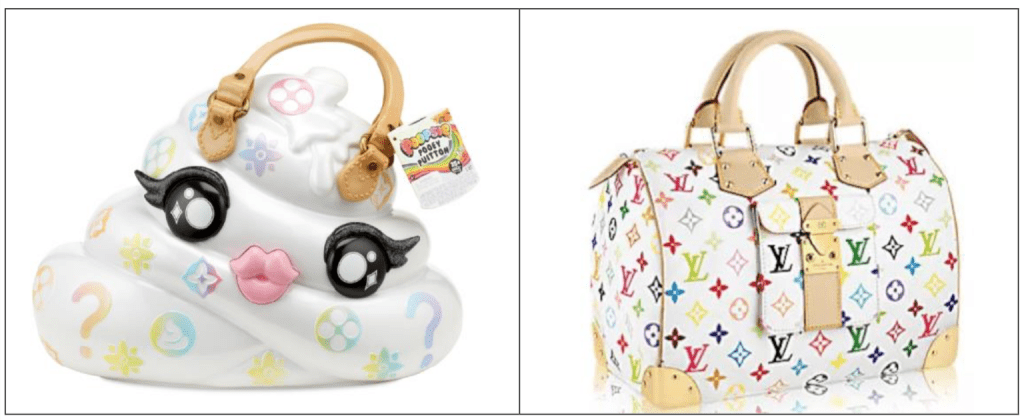Look beyond Louis Vuitton’s recently-unveiled Marc Newson-designed luggage collection, its latest star-studded ad campaign featuring Emma Stone, Alicia Vikander and Léa Seydoux, and the barrage of headlines that it has been making on the heels of showing – and then subsequently swearing off – a controversial Michael Jackson-themed menswear collection, and you will see that a budding bi-national trademark battle between the world’s most valuable luxury brand and a multi-billion dollar U.S. toy company is underway.
On the heels of filing suit against Louis Vuitton in a federal court in Los Angeles in late December, in which it asked the court to declare that its hot-selling Pooey Puitton toy is not running afoul of Louis Vuitton’s intellectual property rights, MGA Entertainment filed an amended complaint late last week. The Southern California-based toymaker’s modified complaint, which was filed with California’s Central District Court on Friday, sheds a bit more light on the global nature of the parties’ legal fights … there are, after all, two of them.
In particular, the new filing provides additional details about why exactly MGA opted to initiate a declaratory judgment action – one that, at its core, depends on there being an “actual, present, and justiciable controversy” at play – against the luxury brand, in lieu of any formal threats of litigation from Louis Vuitton on U.S. soil.
It turns out, MGA was largely prompted to file suit against Louis Vuitton in the final days of 2018 after the Paris-based brand commenced an action against it in a Paris court in early December.
The parties’ battle got its start “on or around” December 7, 2018 when Louis Vuitton, despite already “being in possession of a Pooey product that it had purchased and [used to] identify MGA as the source,” requested and received a seizure order from the Tribunal de Grade Instance de Paris.
Court order in hand, Louis Vuitton seized “approximately 2 Pooey products” from wholesale customers of MGA in Europe, and thereafter, filed suit against the toymaker in France, asserting various claims based on MGA’s use of similar “motifs and patterns” on the toy to ones for which Louis Vuitton maintains trademark and copyright registrations. As a result of such use, Louis Vuitton alleged that MGA has “undoubtedly damaged the distinctive character and reputation attached to” its valuable trademarks, and is seeking “several forms of relief including but not limited to disclosure injunction, desist and destruction, and compensation claims.”
With the foregoing lawsuit in mind, MGA filed suit in the U.S., asking a federal court to preemptively declare that its Pooey Puitton product is not infringing or diluting Louis Vuitton’s domestic trademark rights. MGA’s decision to file suit likely stems either from a desire to prevent Louis Vuitton from filing suit against it in the U.S. or a strategic move to force Louis Vuitton into legal action should the brand have opted not to file suit in the U.S., where it has been handed a few losing hands in parody-centric cases in the past.
As for how these two jurisdictionally-distinct cases are expected to play out, it will be particularly interesting to watch, in large part due to differences in terms of how courts treat parody.
MGA has already asserted both in its initial complaint and its recently amended one that “Pooey name and Pooey product are protected fair use and parody,” and will likely make something of a similar argument in the French case, as well, in an attempt to escape liability for using the similar “Pooey Puitton” name and lookalike graphics on its toy.
In accordance with trademark law, certain unauthorized uses of others’ trademarks – including plays on another party’s trademark for the purpose of humorous effect or social commentary, or parodies – may be permissible. “The basic idea” under U.S. federal law, according to Harvard Law, “is that artistic and editorial parodies of trademarks serve a valuable critical function, and that this critical function is entitled to some degree of First Amendment protection.”
If a design is deemed to be an effective parody, such a finding will allow its creator to dodge liability for infringement.
Such a claim very well may enable MGA to sidestep at least some liability in the U.S., just as My Other Bag did in the case that Louis Vuitton filed against it, but the outcome in the French case will almost certainly differ. This is because while courts in the U.S. have routinely entertained a parody exception to trademark infringement and dilution, their French counterparts have proven to be far less willing.
In terms of European case law, DLA Piper’s Elena Varese noted that courts are “quite reluctant to observe [a parody] defense [to trademark infringement], especially in connection with the unauthorized commercial use of a well-known trademark,” which is precisely what Louis Vuitton asserts in going on here.
Eleonora Rosati, a lawyer and intellectual property professor at the University of Southampton, agrees. Despite European Union trademark law containing language stating that the use of a trademark “for the purpose of artistic expression should be considered as being fair as long as it is at the same time in accordance with honest practices in industrial and commercial matters,” to date, “French courts have not been too generous” in finding parody.
More than that, Rosati says, “In Europe, well-known trademarks enjoy enhanced protection compared to ‘ordinary’ trademarks,” which bodes well for Louis Vuitton. The balance here is so thoroughly in favor of famous rights holders, she says, that to establish trademark infringement, a trademark holder need only show that “the alleged parody establishes a ‘link’ with a well-known trademark, and that link free-rides on the repute of the well-known trademark, tarnishes its repute and/or blurs its distinctive character.”
In other words: stay tuned. This is a couple of fights worth watching.
*The U.S. case is MGA Entertainment, Inc. v. Louis Vuitton Malletier, S.A., et al, 2:18-cv-10758 (C.D. Cal.).











